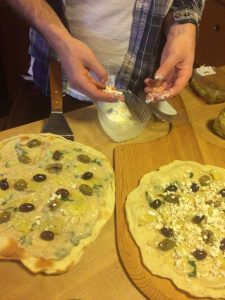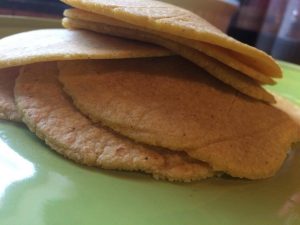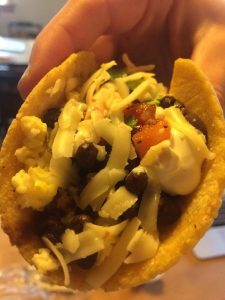Week 9 Tasting Lab
A wonderful lunch was prepared by Sarah, Karen, and Brittany. Sarah prepared a quinoa tabbouleh, Karen brought in a peanut soup, and I wish I knew what Brittany used to make the soup that she prepared because it had a rich, cheesy texture I hadn’t had before in a soup. All of the dishes brought were outstanding. Given all of the political strife and jumbled emotion and energy being transposed and reverberated throughout the student body and through RAD services, professors, and other affiliates on campus this meal provided a safe haven to relax from academic studies and enjoy the presence of one another. Karen’s soup she prepared held the dense peanut flavor and the texture was thin which made me think why it was enjoyable because of distinct memories of peanut butter having a thick texture. The tabbouleh that Sarah brought inspired a quick study of the history of tabbouleh because last weekend a member of the community at Fertile Ground brought tabbouleh as a gift to Gail, Chris, and I while we were working on the compost bins. I found that it is a mezze, or a selection of small dishes that is often served before wine tasting (I can’t help but wonder about the neuroscience behind that), which went very well with the two soups that were provided. During the meal itself, I couldn’t help but smile when I struggled to eat the green leaf in my vegetarian salad which helped internalize the room for growth in my ability to prepare salads that are not exclusively leafy greens. Brittany’s soup was heartfelt and we had a powerful conversation about breath, physiological stress, and relaxation while we ate. She is wonderful.
Tea Tasting
This week’s tea tasting topped last week’s once again. Being a part of Kotomi’s growing process the past two quarters has been an unbelievable joy. This week we tasted Macha – a powerful tea that held warmth in my belly. The presence of the collective group this week was remarkable. In last week’s tea tasting experiment, Kotomi discussed the history of Chinese and Japanese tea practitioning styles and mentioned how a Chinese practitioner of tea tasting offered her to come in and show how she learned to practice tea. Right before the Kotomi tea tasting the previous week, I was in a position to present to the class as a requirement and I was not feeling confident in the presentation which held a bias for the perception of the cinnamon and music combination in the overall experience. Kotomi learned from my errors and the next week demonstrated the most powerful experience I have ever had with tea. I felt the singing bowls as large spheres of energy reverberating off of the rim of the cup towards me. I am unable to remember the entirety of what Kotomi said, but afterwards Kotomi discussed how thinking through emotion and the nervous system can inhibit being, which reminded me of a previous week’s seminar discussion about thought being interconnected with emotion. Given Sarah’s reaction from last week and this week’s tasting labs, Kotomi learned from observing my presentation and from her strength I learned the significance of sustaining the perception of emotions and nervous system care. The macha we tasted was silty green with a thick viscosity in appearance and had a musky, rich flavor with silty texture and rich, complex flavor. Kotomi discussed her amazed respect for the Senorouku tea master ceremony which uses charcoal to heat the tea kettle to the precise temperature, the use of a whisk, frankincense, and how she decided to add flowers to her final presentation to the class. Once again, it has been wonderful having Kotomi do the tea tastings for the program and seeing her growth over the last two quarters.



